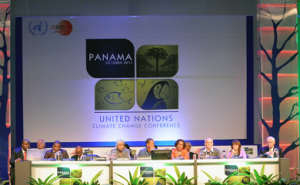From October 1-7, 2011 the UNFCCC held an Intersessional in Panama City, Panama. The City known for the famous Panama Canal, which connects ships carrying goods from the Eastern Hemisphere to the Western Hemisphere and vice versa, also served as a crucial connection between the Bonn, Germany Intersessional [see article on UNFCCC Bonn conference] and COP-17 in Durban, South Africa.
Parties’ main goal of the Intersessional was to come to areas of convergence so they could develop draft text in Panama City that can be negotiated for decisions in Durban. The Intersessional held informal negotiations on agenda items under the Ad-hoc Working Group on the Kyoto Protocol (AWG-KP) and the Ad-hoc Working Group on Long Term Cooperative Action (AWG-LCA). A small advocacy team went to Panama City focusing on the negotiations under the AWG-LCA [see UNFCCC website for more information] and provided technical advice to delegates including those supported by the Women Delegates Fund.
 Under the 3rd part of the 14th session of AWG-LCA[1] the advocacy team observed several of the agenda items but focused on adaptation, finance and technology, three of the fastest moving areas with expected outcomes in Durban that are relevant to the implementation of the Cancun Agreements. Adaptation negotiations centered on the Adaptation Committee; technology negotiations on the Climate Technology Center and Networks (CTCN); and finance negotiations on long term finance and the standing committee. The Adaptation Committee, CTCN and the Standing Committee are all expected to be implemented in Durban. In addition, there were briefings on Fast Start Finance and the Transitional Committee of the Green Climate Fund. Though negotiations were rocky in the beginning, there were some good outcomes, with draft negotiating texts in adaptation, finance and technology. The advocacy team worked well with supportive delegates of gender in these negotiations and the draft texts for the Adaptation Committee, CTCN and the Standing Committee have some references to gender and/or women, which bodes well for gender-responsive decisions in Durban. However, many of the other areas under the AWG-LCA and the AWG-KP still did not have much convergence in Panama City. It will be up to Parties to move quickly and come to decisions in order to have a successful outcome in Durban.
Under the 3rd part of the 14th session of AWG-LCA[1] the advocacy team observed several of the agenda items but focused on adaptation, finance and technology, three of the fastest moving areas with expected outcomes in Durban that are relevant to the implementation of the Cancun Agreements. Adaptation negotiations centered on the Adaptation Committee; technology negotiations on the Climate Technology Center and Networks (CTCN); and finance negotiations on long term finance and the standing committee. The Adaptation Committee, CTCN and the Standing Committee are all expected to be implemented in Durban. In addition, there were briefings on Fast Start Finance and the Transitional Committee of the Green Climate Fund. Though negotiations were rocky in the beginning, there were some good outcomes, with draft negotiating texts in adaptation, finance and technology. The advocacy team worked well with supportive delegates of gender in these negotiations and the draft texts for the Adaptation Committee, CTCN and the Standing Committee have some references to gender and/or women, which bodes well for gender-responsive decisions in Durban. However, many of the other areas under the AWG-LCA and the AWG-KP still did not have much convergence in Panama City. It will be up to Parties to move quickly and come to decisions in order to have a successful outcome in Durban.
Emilia Reyes of Equidad de Genero and member of the GGCA Advocacy Team gave an intervention on behalf of the Women and Gender Constituency at the closing plenary encouraging Parties to remain focused on who their decisions will impact: To develop a clear path through these negotiations, we must focus on the people and make decisions that serve and involve both women and men, girls and boys, equitably, within the design of institutions, in the decision making processes and in the implementation of actions at all levels, especially in communities [full text available here]
Outside of the Negotiations
Rachel Harris, Advocacy Coordinator of WEDO along with Patience Damptey from Ghana of the Women Delegates Fund, participated in a side event by the World Health Organization (WHO), which aimed to find clearer links and synergies between gender, climate change and health. Other participants included a representative from the WHO office in Panama and a representative from the Interagency Climate Change Project in Panama.
Rachel also attended the SBSTA expert meeting on Guidance on systems for providing information on how safeguards for REDD-plus activities are addressed and respected as a representative of the Women and Gender Constituency.
More information regarding this meeting can be found here: http://unfccc.int/methods_science/redd/items/6149.php.
[1] Agenda items include mitigation, adaptation, finance, technology, capacity building, the review, legal outcome and other matters (http://unfccc.int/files/meetings/ad_hoc_working_groups/lca/application/pdf/awg-lca_14_adopted_agenda.pdf)


